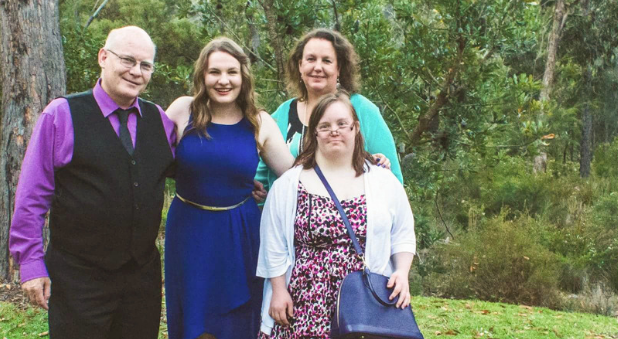David and Heather Brake know first hand that there’s a lot we can learn from people with Down Syndrome. When Mrs Brake found out at 20 weeks pregnant that her eldest daughter, Karlie, would be born with the chromosome complication, she prayed for two things in particular.
Two things Heather prayed for her unborn child
“One, that she would be converted early, because God would give her the strength and resilience to deal with the rubbish in life from some people,” says Mrs Brake, who attends St Barnabas’, Ingleburn. “Two, that God would give me what I could handle in terms of symptoms, because there are lots of variations.”
"We limit people like Karlie when we assume they can't learn"
Throughout Karlie’s life, Mrs Brake has seen God answer both of these prayers. Karlie loves the Lord and works hard to learn about him.
“If you ask her what the main points of the sermon were, she can tell you,” Mrs Brake says. “People assume that because you have an intellectual disability that you can’t know God in the way others can. I think that denies the work of the Holy Spirit. He’s the one who gives understanding. We limit people like Karlie when we assume they can’t learn.”
Mr Brake recognises there is room for improvement in how churches include those with disabilities.
“People don’t mean to be mean, but they don’t understand and get scared,” she says. “Everyone is different. Sometimes you just have to learn: sit down with the family, find out what things will make them feel comfortable and how to communicate with them. They can be integrated quite well.”
"What gets me through is that God is in control"
She has experienced some great support from churches and Christians who have taken the time to consider how best to include Karlie. “If more people thought it through like they did, it can be a positive experience for other families with disabilities. What would be ideal is recognising that this is an area we need to train people in to help with integration.”
Although it’s been joyful, the journey hasn’t been easy for the Brake family.
“What gets me through is that God is in control and he has a purpose,” Mrs Brake says. “God was always there, even when it seemed like he wasn’t. God allows Karlie to have Down Syndrome for a whole lot of reasons, not just for our family.
“I used to visit other mothers who had babies with Down Syndrome and share my story. Being able to say ‘This isn’t really that bad’ helps others to see that it is not a negative, it’s a positive.”
"It's not a negative - it's a positive"
When Karlie was three and a half months, she needed major heart surgery. “A nurse at the time said, ‘I don’t know why we keep these kids alive, their quality of life is going to be so poor,’” Mrs Brake recalls. “But that’s not their perspective of their life.” Karlie’s life is quite the opposite – so full of joy that it overflows into the lives of those around her.
“It’s really detrimental to society that we now just abort anything that looks like it might be a problem,” Mrs Brake says. “These people teach us how to love others, to be accepting and encouraging, and to stop focusing on ourselves. Our society likes to focus on everything being perfect, having the perfect child and the perfect education, and I think people assume that if you’re not perfect, your life is not valuable.”


-2.JPG)






















